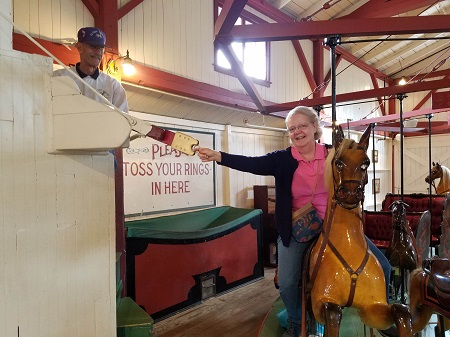Bite the Dust
 I watched an old friend bite the dust last week. He had greeted me faithfully every day for years. Standing stately and tall, the mighty oak inspired me to do the same.
I watched an old friend bite the dust last week. He had greeted me faithfully every day for years. Standing stately and tall, the mighty oak inspired me to do the same.
I knew my friend was dying.
He was many times older than me. With each new season, he grew weaker and suffered more losses. Yet, my heart hurt when he finally fell.
Oh, the stories he could have told, if only he could have talked.
- Birds born in his branches
- Children who played in his shade
- Young love ignited with spring’s new growth
- Seniors who smiled at memories shared
- Death of people, plants, and pets
 Like the circles inside his trunk, so goes life.
Like the circles inside his trunk, so goes life.
- Birth
- Childhood
- Adolescence
- Adulthood
- Death – the end of the road
We all die. Eventually we bite the dust.
However, death does not have to be the end.
When Jesus rose from His tomb on the third day, He defeated sin and death.
If we accept Jesus as Savior and Lord, we receive His victory over sin and death.
He promises an eternal home in heaven when we leave this world.
Thank you for the reminder, dear friend. I will miss you.
“‘He will wipe every tear from their eyes. There will be no more death’ or mourning or crying or pain, for the old order of things has passed away.” (Revelation 21:4 NIV).
Thanks to Jeri Stone for the photo of my friend before he bit the dust.
Do you have an expression you want explained? If so, please comment below.
Subscribe to receive my weekly posts by email and receive a free copy of “Words of Hope for Days that Hurt.”
If you enjoyed this post, please share it with your friends.
 My friend Ann learned to grab the brass ring while at the
My friend Ann learned to grab the brass ring while at the  Penn’s Store
Penn’s Store I don’t like to play golf. When family or friends invite me, I play a half-hearted game. I prefer to
I don’t like to play golf. When family or friends invite me, I play a half-hearted game. I prefer to  More than one way to skin a cat sounds cruel. We don’t want our cute, fur-covered pets to suffer.
More than one way to skin a cat sounds cruel. We don’t want our cute, fur-covered pets to suffer. Congratulations to Stephen Russell, whose name was drawn from my mailing list for a free copy of Adventures in Fatherhood by Carlton Hughes and Holland Webb.
Congratulations to Stephen Russell, whose name was drawn from my mailing list for a free copy of Adventures in Fatherhood by Carlton Hughes and Holland Webb. After Mom washed our clothes and put them
After Mom washed our clothes and put them  Many people wonder if anyone hears what they say. Their words seem to go in one ear and out the other.
Many people wonder if anyone hears what they say. Their words seem to go in one ear and out the other. Have you noticed how often we change our lives? We try to improve ourselves, other people, or our possessions. A desire to improve can be a wonderful idea. However, if it ain’t broke, don’t fix it. (I apologize for the poor grammar, but that is the way we say it.)
Have you noticed how often we change our lives? We try to improve ourselves, other people, or our possessions. A desire to improve can be a wonderful idea. However, if it ain’t broke, don’t fix it. (I apologize for the poor grammar, but that is the way we say it.) After I told a friend of recent family health problems, she said, “Oh, my goodness, Diana. You have sure been through the wringer.” Life has certainly felt that way.
After I told a friend of recent family health problems, she said, “Oh, my goodness, Diana. You have sure been through the wringer.” Life has certainly felt that way. “Stay right there. I’ll be back in a jiffy.” I wonder how many parents have said that to a child. Or how many spouses have said that to one another. They don’t want the person to move. They will return quickly
“Stay right there. I’ll be back in a jiffy.” I wonder how many parents have said that to a child. Or how many spouses have said that to one another. They don’t want the person to move. They will return quickly